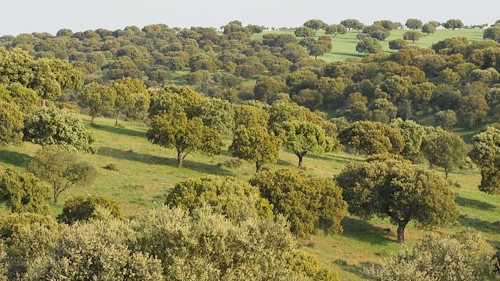The production of Iberian ham is one of the most valued traditions in Spanish gastronomy, but like many food industries, it faces the challenge of adapting to more sustainable and environmentally friendly practices. This article explores how the Iberian ham, Serrano ham, and Iberian pork shoulder industries are addressing ecological challenges and what initiatives are being implemented to ensure their sustainability in the future.
The Environmental Impact and Sustainability in Iberian Ham Production
The Iberian ham industry, deeply rooted in Spanish gastronomy, is now evolving to face the challenges of modern sustainability. The dehesa, a unique ecosystem where Iberian pigs roam freely, plays a pivotal role in maintaining biodiversity and reducing the carbon footprint of acorn-fed iberian ham production. In contrast, Cebo ham, raised intensively on farms, has a larger environmental impact due to industrial methods.
Efforts are underway to adopt sustainable practices across the industry. Initiatives such as the use of renewable energy, efficient water use, and regenerative agriculture are gaining momentum, aiming to reduce the environmental toll of both Iberian ham and Serrano ham production.
Rotational grazing and responsible resource management within the dehesa ensure that soil degradation is minimized, preserving this critical environment for future generations. Iberian pigs raised in the dehesa are integral to a balance that nurtures biodiversity, including indigenous plant and animal species.

Global Demand and Environmental Challenges
With growing international demand, especially from countries like France and Germany, the industry faces pressure to expand production. However, this poses a significant challenge: balancing this increased demand with sustainable practices. As more people discover the unmatched quality of Iberian ham, the industry must avoid over-exploiting natural resources.
Another major concern is the impact of climate change on the dehesa. Rising temperatures and changing weather patterns affect the growth of oak trees and the production of acorns, a key food source for bellota pigs. This directly threatens the future supply of high-quality bellota ham, requiring innovation and adaptability from producers.
Green Initiatives in Spanish Ham Production
Many Iberian ham producers are implementing green initiatives to mitigate their environmental impact. Some are switching to renewable energy sources, such as installing solar panels in processing plants, and adopting water recycling systems to minimize waste. Additionally, there is a shift towards reducing plastic use in packaging, opting for recyclable or biodegradable materials.
These measures not only lower the industry's carbon footprint but also appeal to environmentally conscious consumers who are increasingly prioritizing sustainable products. The industry is also working on certifications that guarantee ecological practices across the entire production chain, from pig rearing to the final product.
At Jamón Pasión online store we are strongly committed to producers who adopt these initiatives, which also translates into a product free of preservatives, colorings or nitrates, offering a section with absolutely 100% natural hams and pork shoulders, without additives, so its ingredients are basically ham and sea salt.
The Future of Iberian Ham: Balancing Tradition and Sustainability
While significant strides have been made, the Iberian ham producers still faces numerous environmental challenges. The pressure to meet growing global demand without compromising sustainability is an ongoing struggle. In the face of these challenges, producers must continue to innovate by adopting new eco-friendly practices while staying true to the tradition that has made Iberian ham a global delicacy.
For the industry to thrive sustainably, maintaining the health of the dehesa, managing natural resources responsibly, and reducing its environmental footprint will be key. Through a combination of traditional methods and modern sustainable innovations, the future of Iberico ham can remain secure while contributing to global environmental conservation efforts.
